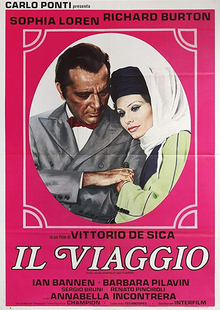| The Voyage | |
|---|---|
 Italian theatrical release poster | |
| Italian | Il viaggio |
| Directed by | Vittorio De Sica |
| Screenplay by |
|
| Based on | Il viaggio by Luigi Pirandello |
| Produced by | Carlo Ponti |
| Starring |
|
| Cinematography | Ennio Guarnieri |
| Edited by | Franco Arcalli |
| Music by | Manuel De Sica |
Production companies |
|
| Distributed by |
|
Release dates |
|
Running time | 102 minutes |
| Countries |
|
| Language | Italian |
The Voyage (Italian : Il viaggio; also released as The Journey) is a 1974 romantic drama film directed by Vittorio De Sica, based on the short story Il viaggio by Luigi Pirandello. It was De Sica's final film. [1]